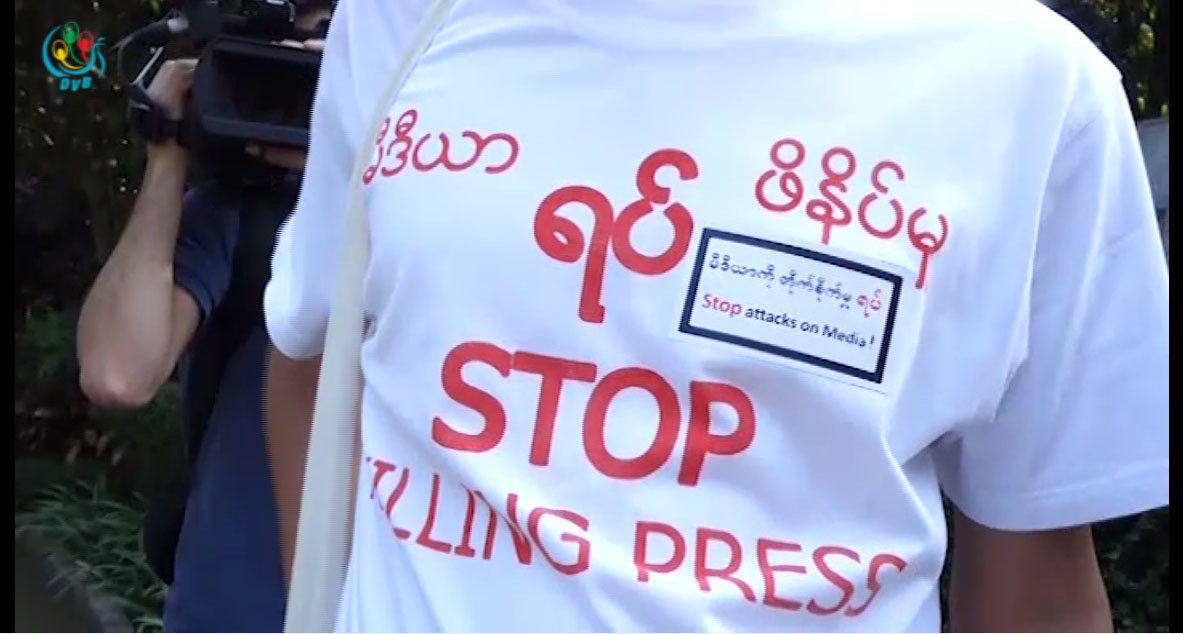Burma features alongside North Korea, Eritrea and Saudi Arabia in a newly compiled shortlist of the world’s ten most censored countries, following a year that saw deaths and arrests among journalists in the supposedly transitioning state.
The index drawn up by the Committee to Protect Journalists (CPJ) details the tactics used by governments to repress freedom of expression, and Burma, officially known as Myanmar, comes under the spotlight for its domineering attitude towards the press during 2014.
[pullquote]”While the press can report on issues that were previously banned, there are still several no-go areas.”[/pullquote]
“Media freedom in Myanmar has deteriorated rapidly over the past year, witnessed in the censoring, jailing and killing of journalists,” Shawn Crispin of the CPJ told DVB.
“The period of openness beginning in 2012 was ephemeral, with the regime now clearly bent on reasserting control over the press and threatening journalists who report on [matters] perceived as sensitive topics,” he says.
2012 saw the abolition of the 1962 Printers and Publishers Registration Act that oversaw the strict censorship of previous decades, though fearful authorities continue to use a number of instruments to control dissident voices, according to the CPJ.
“While certain Ministry of Information officials have taken a more progressive position on the need for greater media freedoms, others still view a free press as a threat that must be contained,” said Crispin.
“Until this mindset changes, Myanmar will remain among the world’s most censored countries. And we strongly doubt the appointment of U Tint Swe, who headed the previous junta’s pre-publication censorship agency, represents a step in the right direction,” he said, referring to the appointment of Burma’s former chief censor in a new permanent secretariat position at the Ministry of Information in recent days.
2014’s restrictive Printers and Publishing Enterprise Law effectively saw the continuation of official censorship, and the enforced state registration of media outlets. According to Article 7 of the law, media outlets are not allowed to publish material containing statements that are “against and violate the provisions of the constitution and other legislation”. Those who are seen to breach this law can be jailed or fined.
Journalists are also restricted from reporting from the side of anti-government forces in the ongoing fighting in border areas.
[pullquote]”The regime is now clearly bent on reasserting control over the press.”[/pullquote]
In October 2014, freelance journalist Aung Kyaw Naing, better known as Par Gyi, was killed while in military custody after being embedded with the Democratic Karen Benevolent Army.
His death, and the obfuscation of the circumstances around it, underlined the dangers that journalists face if they attempt to subvert the government’s tight grip on information. This restriction results in a shortage of credible facts and figures from conflict zones, as demonstrated in the recent fighting in the Kokang region.
“While the press can report on issues that were previously banned, there are still several no-go areas, including any probing investigations into the activities or the interests of the military and its top leaders,” says Crispin.
Five journalists of the independent Unity Journal were sentenced to seven years – reduced from ten – after being found guilty of “exposing state secrets” following the journal’s publishing of an article alleging the existence of a secret chemical weapons factory in central Burma. At the time of the sentencing, defence counsel Robert San Aung told DVB that he believed the court had been influenced by government forces.
Also jailed last year were three reporters and two publishers of the Bi Mon Te Nay, who published an article citing a false claim that opposition leader Aung San Suu Kyi had formed an interim government to depose the ruling Union Solidarity and Development Party government. They were arrested and charged under Article 505(b)* of Burma’s Penal Code, a frequently used tool to keep a lid on activism.
[related]
Such abuses of power paint Burma’s reforms as insubstantial, Crispin argues, saying: “Without a free press check on the military, arguably the real source of political power in the country, Myanmar’s pretensions to democracy will ring hollow.”
*Article 505(b) deals with “whoever makes, publishes or circulates any statement, rumour or report … with intent to cause, or which is likely to cause, fear or alarm to the public or to any section of the public whereby any person may be induced to commit an offence against the State or against the public tranquillity.”



